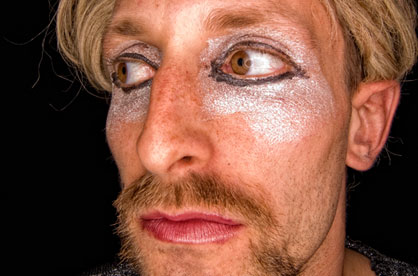
With his two Dischord-borne bands (Antelope; El Guapo, a.k.a. Supersystem) now defunct, Justin Moyer has returned to his nom de electro, Edie Sedgwick. While he looks a bit like Pop Levi these days, we can assure you that Sedgwick’s second LP (the Ian MacKaye-aided Things Are Getting Sinister And Sinisterer) isn’t on par with Pop sonically. This is a good thing–a very good thing. As Kim Coletta, the founder of DeSoto Records–Sedgwick’s original label–puts it, Moyer envisions Sedgwick as a “white, booger-drag version of Fela Kuti, Screaming Jay Hawkins, and the Ol’ Dirty Bastard. Or, maybe, a transgendered Ian Svenonius.”
The guy’s also one hell of a writer, as you’ll see in his Sinister commentary below. (Fans of self-titled‘s previous print incarnation, DIW, might also remember Sedgwick’s pointed–and dare-we-say-entertaining–essay on postmodernism from a few years back.)

Since the demise of all printed media is scheduled for 2013 or, at the very latest, 2015, I, Edie Sedgwick, always jump at the chance to interview myself gratis for Web publications. Please enjoy this track-by-track discussion of my new record Things Are Getting Sinister and Sinisterer, released on Washington, DC’s Dischord Records in November of this year.
1. Sissy Spacek
The 1976 Brian De Palma film Carrie, based on Stephen King’s novel of the same name, is the sorry product of male-dominated American cinema’s coordinated attempt to demonize pre-pubescent female protagonists at or near menstruation’s onset (see also The Exorcist, I Spit on Your Grave, Firestarter, Cape Fear, that character in X-Men, Just One of the Guys, The Golden Compass). “Sissy Spacek” turns this pathetic filmic convention on its head, juxtaposing the misogynist rant of demented religious leader–”And that pig’s blood came down in a red flood!”–against the celebratory musings of a liberated, telekinetic “womyn” coming to a danceable understanding of her body’s new productive and extrasensory capabilities.
2. Mary-Kate Olsen
As half of the billion dollar Olsen twin franchise, M.K.O. has heretofore been forced to express a false, pathological individuality–to “deny the tedious Geminis”–in the two dead-end endeavors: bulimia and drug addiction. My composition is a comprehensive “fuck you” to all the vicious capitalists who cannot conceive of M.K.O. beyond from the profit-generating Olsen twins unit, including the media, the worldwide “Tweenie” community, and ex-beau Jared Leto.
3. Angelina Jolie
While Angelina Jolie is an internationally-respected U.N. ambassador, the intractable (sp?) damage she caused to Brad Pitt’s marriage to America’s best Friend Jennifer Aniston means that her charitable work must be examined through the cynical lens of public relations. My song does not criticize Jolie’s fetish for multicultural adoption–for “getting black babies”–but merely asks: are her motivation’s purely humanitarian? And, if they aren’t, does that matter?
4. Anthony Perkins
Anthony Perkins, a bisexual who died of AIDS in 1992, is best known for his portrayal of serial killer Norman Bates in Alfred Hitchcock’s 1961 classic Psycho. My song’s chorus (“Things are getting sinister and sinisterer/I am getting nervouser and nervouserer”) expresses concern that Perkins’ private sexual preferences have been conflated with his cinematic image of as murderous pervert. This would be (has been?) a PR disaster for the polysexual community of which I am a part.
5. March Of The Penguins
Despite the insistence of Sarah Palin’s uncurious constituency, Darwinian natural selection and subsequent evolution shape everyone’s journey on Spaceship Earth. “March of the Penguins” celebrates the fact that I, Edie Sedgwick, like the King Penguin so beautifully depicted in the 2006 documentary narrated by basso profundo Morgan Freeman, am a product of natural selection and “have endured.”

6. Bambi/G. W. Bush
After eight divisive years of the Bush presidency, this song puts forth woodland creatures’ indifference to politics as an improved model for human behavior, i.e. “learning to be human again by learning to subhuman again.” Isn’t the prospect of putting complex culture wars aside to fight over old-fashioned necessities–food, shelter, sex–seductive?
7. O.D.B.
“O.D.B.” is an ode to visionary, African-American outsider artist Russel James, a.k.a. the Wu-Tang Clan’s Ol’ Dirty Bastard: “This is the storied story of a man who’s armed with ignorant art/A storied story of you shitting on the glass ceiling of art.” What is more exciting than an unlikely underdog–in this case, an ugly alcoholic who brags about his sexually transmitted diseases–producing better music than his brutish, photogenic peers (i.e., the Method Man)?
8. Red Dawn
“Red Dawn” uses dialogue from the film Red Dawn (“All that hate will burn you up boy/It’s that hate that keeps me warm”) to humanize all players, both Capitalist and Communist, in the not-so-Cold War that (as August’s Russian/South Ossetian conflict shows) still burns, still burns.
9. Rob Lowe
Sometimes an actor–a lithe, handsome, sex-tape producing, ruddy-cheeked, saxophone-playing actor–transcends the limits of mere thespianry to become an international symbol of sensuality, decadence, and clean, old-fashioned fun. This actor is Rob Lowe, and “Rob Lowe” is a tribute to him. The song’s unusual chorus (“I say problem/My motherfucking name is Rob Lowe/And when I see a problem I solve ’em/Cause my motherfucking name is Rob Lowe”) name-checks the Sex Pistols song “Problems,” since Johnny Rotten’s pronunciation of that word sounds like “Rob Lowe.”
10. Edie Sedgwick II
Sometimes one needs to write a song about oneself, and that is what this is.


